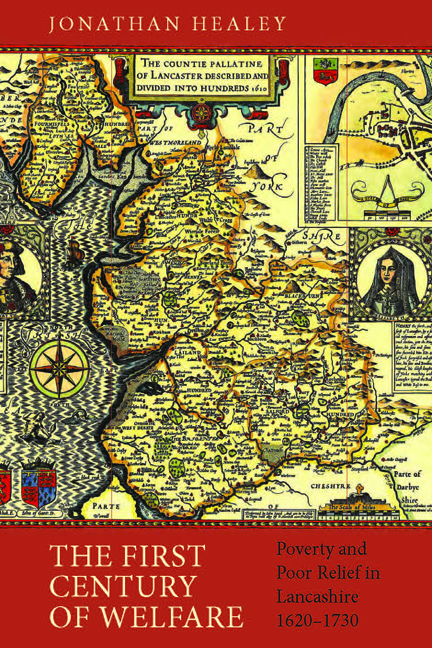Book contents
- Frontmatter
- Dedication
- Contents
- List of Figures
- List of Tables
- Preface
- List of Abbreviations
- Prologue: Becoming Poor
- Introduction: The First Century of Welfare
- PART I CONTEXTS
- 1 Lancashire, 1600–1730: A Developing Society
- 2 The Arrival and Growth of Poor Relief
- 3 Pauper Tales
- PART II MARGINALITY
- PART III MISFORTUNE
- Conclusion: Worldly Crosses
- Bibliography
- Index
2 - The Arrival and Growth of Poor Relief
from PART I - CONTEXTS
Published online by Cambridge University Press: 05 November 2014
- Frontmatter
- Dedication
- Contents
- List of Figures
- List of Tables
- Preface
- List of Abbreviations
- Prologue: Becoming Poor
- Introduction: The First Century of Welfare
- PART I CONTEXTS
- 1 Lancashire, 1600–1730: A Developing Society
- 2 The Arrival and Growth of Poor Relief
- 3 Pauper Tales
- PART II MARGINALITY
- PART III MISFORTUNE
- Conclusion: Worldly Crosses
- Bibliography
- Index
Summary
Constables of Hadocke and Goleborne came to have me write theire presentments for assizes, and when I had donne I writt: ‘Poore is provided, highways repaired, these querys answered, and clarke unrewarded’ att which they laughed most heartily.
Diary of Roger Lowe of Ashton-in-Makerfield (20 August 1664)Before going on to explore the lives of the Lancashire poor, we need to understand the process by which the Poor Laws became part of everyday life in the county. This was a process in which the major steps were taken in the seventeenth century, and so this chapter will tell the story of how this dramatic development in social welfare came about. It is both a necessary backdrop to the ‘pauper tales’ to be told in the rest of the book, and a fascinating case study of how a piece of Parliamentary legislation gradually came to be accepted and enforced in one of the more isolated corners of the land.
Unfortunately, the normal bedrock of studies of the implementation of the Poor Law, overseers’ accounts, do not survive for Lancashire in any great quantity until the 1690s, so historians must argue from impressionistic and difficult sources. Household accounts and family archives, which provide information about the payment of poor rates, give some insight. The papers of parochial churchwardens also provide a sidelight onto the administration of the Poor Laws, as – occasionally – do the records of manorial courts.
- Type
- Chapter
- Information
- The First Century of WelfarePoverty and Poor Relief in Lancashire, 1620–1730, pp. 55 - 81Publisher: Boydell & BrewerPrint publication year: 2014



